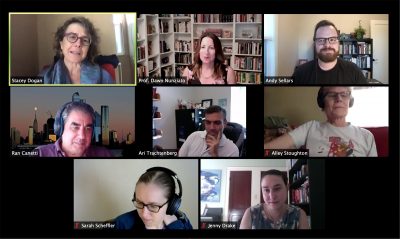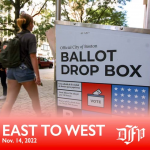The rapid evolution of technology means gaining access to information has never been easier. However, with these advancements come a rise in misinformation, and the line between objectivity and subjectivity has become increasingly blurred.

George Washington University Law School professor Dawn Nunziato held a presentation on Wednesday about social media’s impact on the spread of medical and political falsehoods. The event was a part of the Cyber Alliance Speaker Series organized by Boston University’s School of Law.
At the panel, Nunziato discussed the significance of these platforms and their roles during the COVID-19 pandemic and upcoming presidential election. Her presentation touched on how the First Amendment’s freedom of speech can influence community guidelines for media platforms.
In an interview after the event, Nunziato said companies are hiring separate entities to identify misinformation, but much of the challenge lies in defining what “misinformation” entails.
“They’ll have to figure out on our own how to make determinations about what is truthful and what is misinformation,” Nunziato said in reference to these fact-checking networks.
Ari Trachtenberg, a professor in BU’s College of Engineering who attended the discussion, said after the event that social media’s roles in society are “exactly the kinds of things that we need to be thinking about.” Trachtenberg added that students should be careful with modern developments in technology.
“We are much more connected than we ever were,” Trachtenberg said. “The more connections you have, the easier it is for people to influence people that they otherwise would not have met.”
Su Tran, a freshman in the College of Arts and Sciences, said she believes there’s a balance between exercising freedom of expression and being misleading.
“People are free to post whatever they want,” Tran said, “but they can’t lie about statistics and then have young viewers like us assume that it’s completely true.”
In May, Facebook introduced a new Oversight Board to make decisions surrounding what kind of content is prohibited on the platform. Twitter also updated its guidelines in May to include warnings about potentially false information regarding the pandemic.
Nunziato said that though the platforms “have a long way to go,” they have been generally successful in limiting the spread and impact of misinformation.
“They have flagged millions and millions of pieces of COVID-related misinfo and removed them from their platforms, some with the help of their machine learning, and others with the help of their human content moderators,” Nunziato said. “I think they’ve been pretty effective in the scramble to identify, define and remove harmful misinformation in the context of the pandemic.”
A report from Advertising Analytics and Cross Screen Media found that political spending on digital ads is expected to reach $1.8 billion during the 2019-2020 campaign season, much of which will go to Facebook and Google.
Nunziato said she believes there have been more efforts by Facebook and similar platforms to filter and fact-check the increased number of political advertisements since the last presidential election, but that the quality of those measures varies.
“I think that Facebook is still more hands-off as far as regulating the advertising,” Nunziato said. “Twitter has done a better job in regulating and prohibiting political advertising and the props associated with political advertising. And Google has certainly taken some major steps in the controlling, regulating or micro-targeting of political advertising, which is a bold step on their part.”
The advertising that appears on these platforms can shape the type of content users can see. Trachtenberg said social media platforms can often be biased when it comes to making judgments on the type of content that they allow or remove.
“There’s a fundamental problem here that they have a financial interest in what’s going on,” Trachtenberg said. “The more people, the more controversy, the more everything, the more advertising revenue they get.”
Trachtenberg said platforms might be more hesitant to restrict content that generates argument among users online, even if they otherwise would want to remove it.
Nunziato said she recommends students look at their news sources with a critical eye, especially because they are living in a time when obtaining truthful information is crucial to their voting rights, public health and general safety.
“Students should identify journalists and bloggers that are trustworthy,” Nunziato said. “If they’re getting their news from social media, they should really consider the source and choose sources that are reliable and known to be reliable.”














